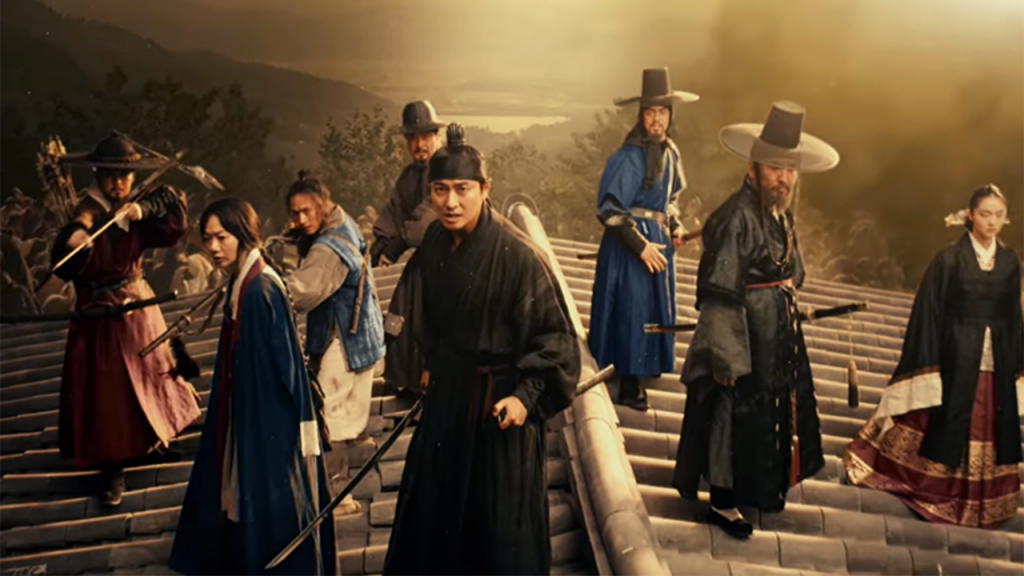There are two seasons of Kingdom to date (2019 and 2020), as well as a 2021 feature-length prequel, Kingdom: Ashin of the North: all demand repeat viewings before the third season begins. Even viewers reluctant to watch horror—and/or period drama—will be enticed by the quality of writing, performances, direction, cinematography and music. The first series is directed by Kim Seong-hun (A Hard Day), joined by Park In-je (The Mayor) in the second series, and each episode feels like a mini epic. Soaring landscape shots suggest the isolation of Joseon-era Korea, and the stark beauty of its mountains and forests. This is television with feature-film production values and aesthetics, and a story that delivers both dramatic incident and political complexity.
The series was the first original Korean TV drama produced by Netflix. Created by Kim Eun-hee, writer of time-travelling crime series Signal (2016), it’s based on her web comic The Kingdom of the Gods (with manhwa artist Yang Kyung-il) and draws on substantial historical research. A fan of Western zombie films, Kim Eun-hee found little support for her vision until after the success of Train to Busan (2016). “I was reading books on the Annals of the Joseon Dynasty and the great famines,” she says. “I started wondering what would happen if we incorporated zombies [in]to the most disastrous period, when the hunger was at its worst.” Her characters see the infection as a plague. “What would have happened had there been an outbreak of disease like cholera or typhoid in Joseon? This was the fundamental idea.”
Some elements of the premise won’t surprise fans of sageuk (historical drama). The king rules only in name; his evil chief councillor holds—and misuses—power, doling out top jobs to family and flunkies, and securing dynastic rule via a loveless royal marriage for his daughter. The motherless Crown Prince Chang (Ju Ji-hoon of Hyena and the Along with the Gods films) is an outcast in the palace. His father’s new wife—much younger, baby-faced, sour (Kim Hye-yun of Inspector Koo)—became Queen Consort after machinations by her father, Lord Cho-Jak-ju (Ryu Seung-ryong, star of Extreme Job and The Admiral: Roaring Currents). Their clan dominates all local and national positions of influence. Queen Consort Cho is pregnant, and promises her father that the baby will be a boy—and therefore a replacement for the Crown Prince, allowing the clan total dominance of Joseon.
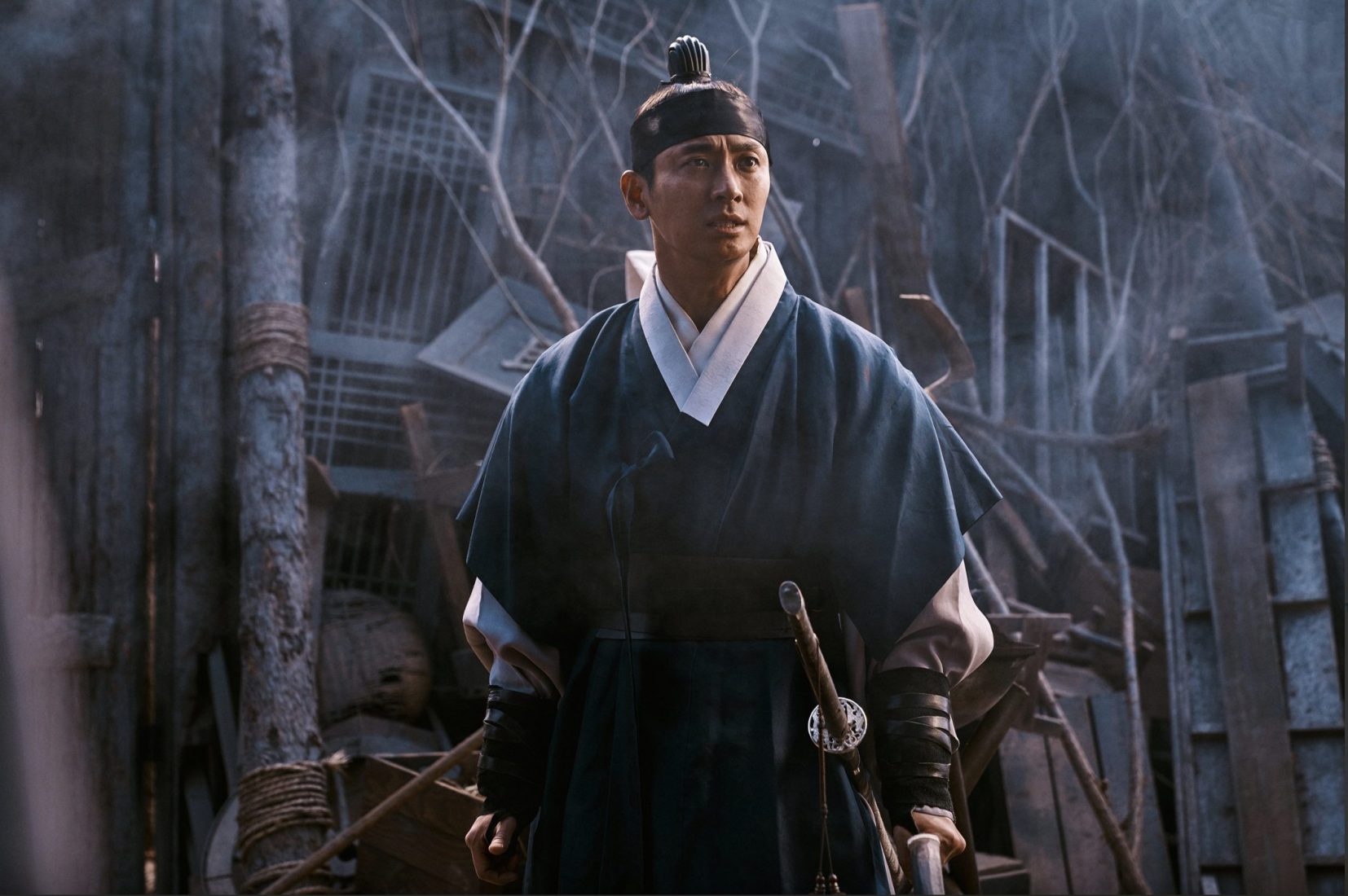
So far, so familiar—especially when the Queen’s storyline resembles a major narrative strand in Empress Ki. But there’s a twist on the trope of weak king in thrall to a powerful noble: the king has died, but this remains a secret from his people and most of the court. Lord Cho-Jak-ju doesn’t want anyone to find out, because then the Crown Prince will inherit all. A former palace physician (Kwon Bum-taek of Steel Rain and The Throne) is summoned from rural retirement to administer the “resurrection plant.” This revives the king, but at a terrible cost. By day he lies asleep in his sick bed. After sundown he wakes a “monster”—a snarling, slavering beast who must feast on human flesh. Various court underlings are sacrificed, their ravaged corpses destroyed at dawn.
But when the physician’s young assistant is attacked, the secret can no longer be contained. The body is returned to the doctor’s home clinic, far to the south, and starving patients are fed human stew by maverick tiger hunter Yeong-shin (Kim Sung-kyu of The Outlaws). Once they’re infected, there’s no controlling their voracious, destructive appetites. Over the course of the two series we’re shown the way this monstrous army becomes the greatest threat to the kingdom and its deadliest weapon of war. The sins of the past loom large. Both science and superstition can be dangerous, but most dangerous of all is greed for power.
Ju Ji-hoon, so prissy and conceited strutting around law offices in Hyena, is a solemn and soulful prince. He begins by trying to save himself from his foes at the court, but realises he has to save the kingdom itself: the series explores, in fact, what it means to be a king. Bae Doona (Stranger, A Hard Day) plays Seo-bi, a female physician who has to be both doctor and detective, trying to uncover the source of and a cure for the purple resurrection plant. Cho clan magistrate Beom-pal (Jeon Seok-ho, another actor from Hyena) fawns over her, but Seo-bi barely notices him. She’s the quiet, intelligent eye in a (male) tornado of action and destruction, defence and attacks, betrayals and deceit.
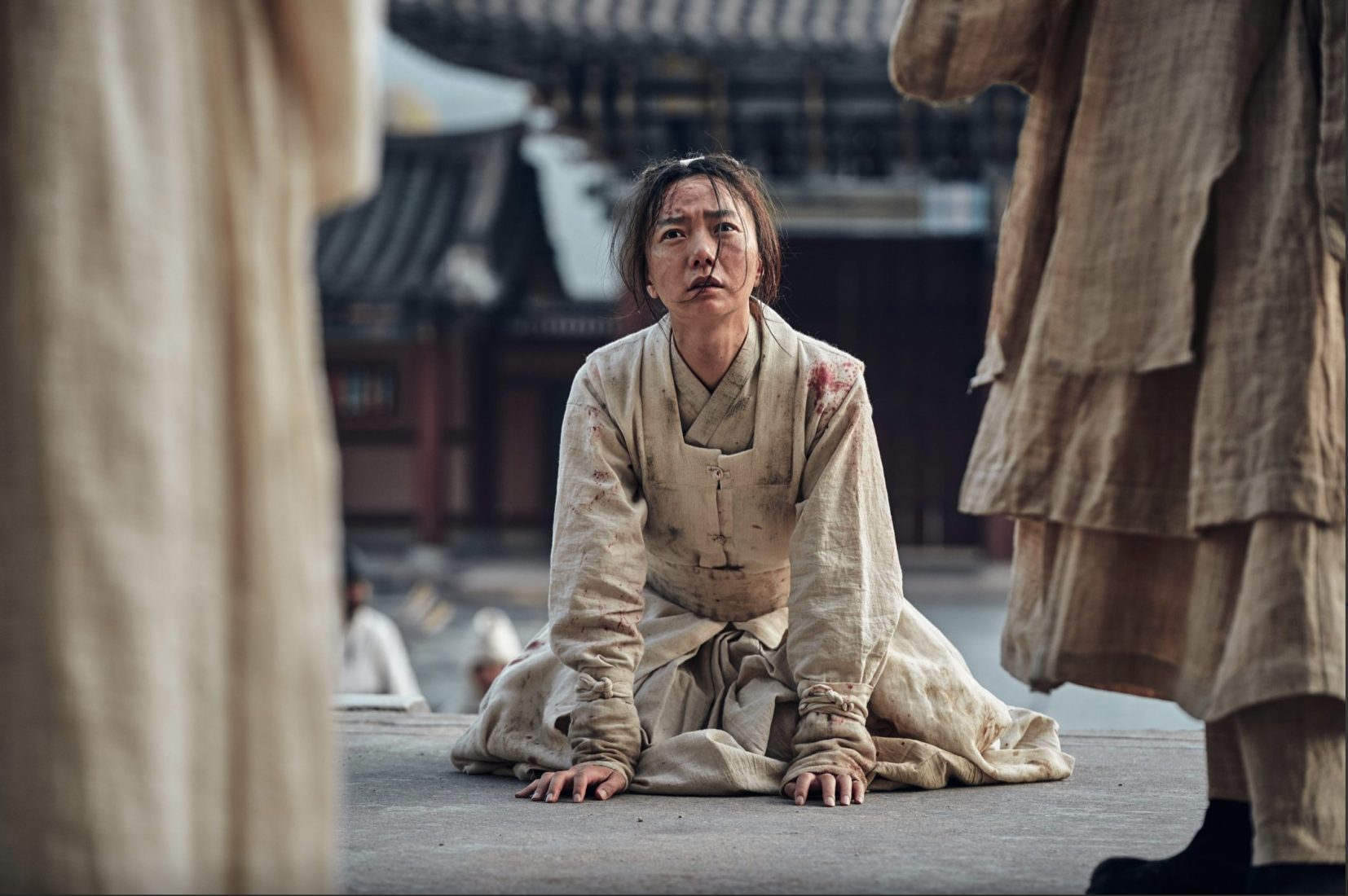
Among the intense battles and narrow escapes there are moments of transcendent beauty in Kingdo—like a poignant death scene in the second season among pale birch trees in the snow—and visceral detail in the mud and squalor of poor areas of towns. The infection spreads, and nowhere is safe, even gated forts or the shadowy cloisters of the palace: they were never safe, the story implies, for the poor struggling through famine and Japanese invasions, or for the rich whose fortunes rise and fall with different political rulers. Joseon is a place of torture and execution, of disease and death, and in this portrayal Kingdom again feels more like a film than a sageuk television series.
It also reflects the actual early history of Joseon, founded in the late fourteenth century and awash with deposed kings and queens, power grabs, beheadings, public riots, purges of officials and scholars, arson at the palace, and pillaging by the Japanese. At the same time—as in the 2016 film Train to Busan—Kingdom explores deep-seated Korean fears about both invasion and destruction from within. The tunnel networks, increasingly porous borders and political upheaval of Kingdom’s Joseon—as well as its social inequities—are not that far removed from the conflict-wracked Korea of the twentieth-century.
In a gore-soaked second series, Kingdom digs deeper into issues of bloodline and inheritance. Does the kingdom need an old family or fresh blood? Who is really “noble” here? Many characters in Kingdom are morally ambiguous, including Prince Chang himself, tiger hunter Yeong-shin, Haewon Cho clan wastrel Beom-pal, the prince’s bodyguard Mu-yeong (Kim Sang-ho of The Negotiation), old war hero Lord Ahn Hyeon (Heo Joon-ho of Designated Survivor: 60 Days), Lee Seung-hi, the royal physician, and—as we’ll learn in Kingdom: Ashin of the North—Min Chi-rok, head of the Royal Command (Park Byung-eun of The Royal Tailor).
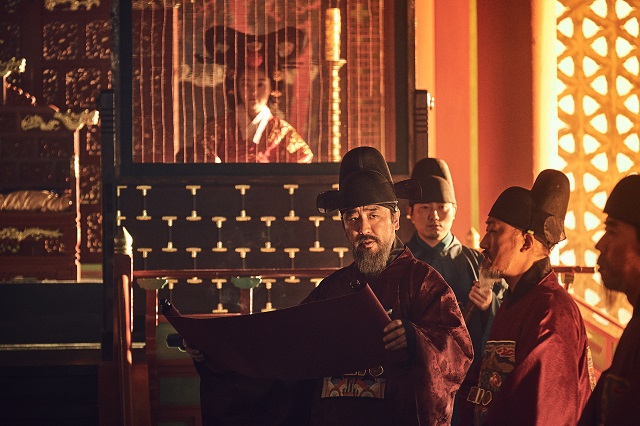
Sacrifice and atonement are increasingly important in the story, as they were in Train to Busan, although the canvas and political scope here are larger. (The key locations are the same as well: Hanyang and Dongnae in Kingdom are the Joseon version of Seoul and a fortress just north of Busan.) When she was writing Kingdom, Kim Eun-hee says she wrote “What is politics?” on the whiteboard in her office. The key question in her mind was what makes an “upright leader” who “truly thinks of the people in the midst of a crisis brought by an unknown disease.”
Performances are excellent in both series, and in Bae Doona’s determined Seo-bi there’s actually a leading female role in an historical drama beyond court lady, servant or shaman. Seo-bi may not be as swashbuckling as Prince Chang, but she makes one of the crucial saves of series two, and leads the way forward—into the third season, we assume—with her intrepid scientific investigation.
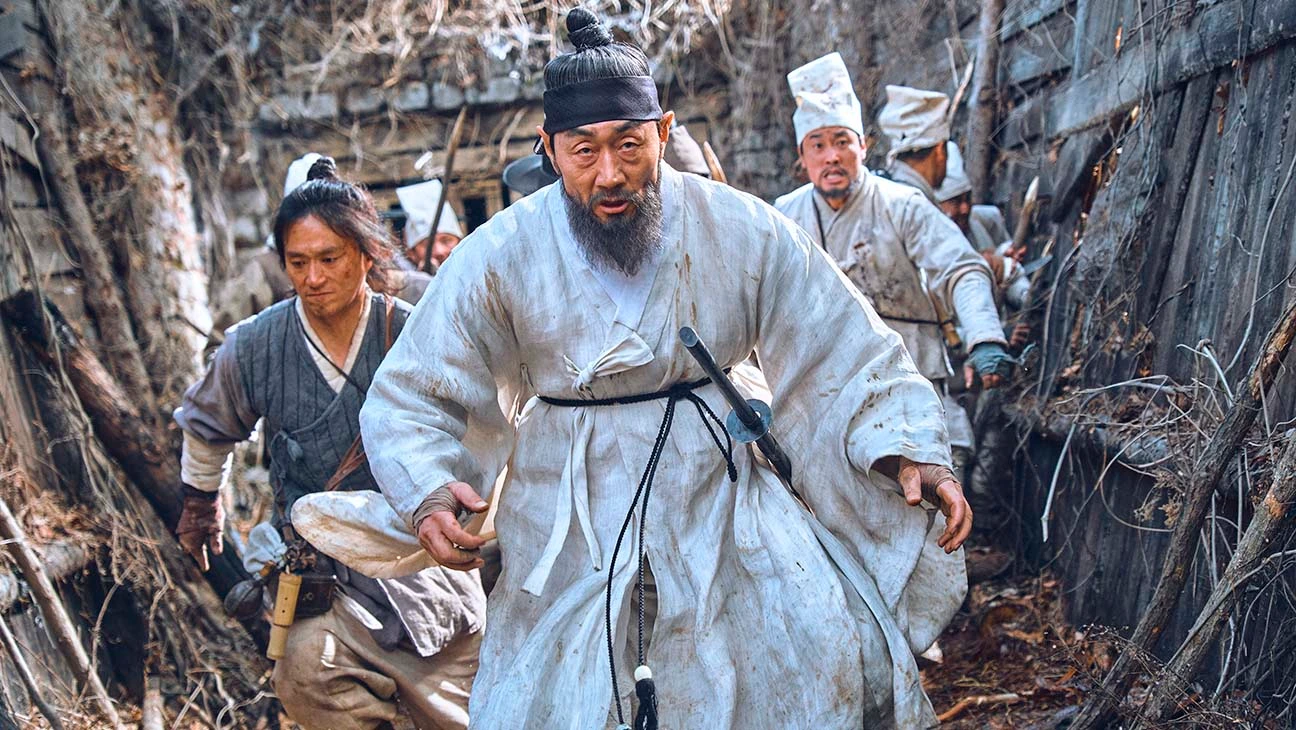
Viewers who fear nothing but crass horror from anything involving zombies shouldn’t be deterred from watching Kingdom. As in our current pandemic, the crisis of infection will reveal the best and worst in characters. There is no simple solution. Its cause will be explored in more detail in Kingdom: Ashin of the North, where we’re reminded the acts of the living can be far more evil than those of the living dead.
